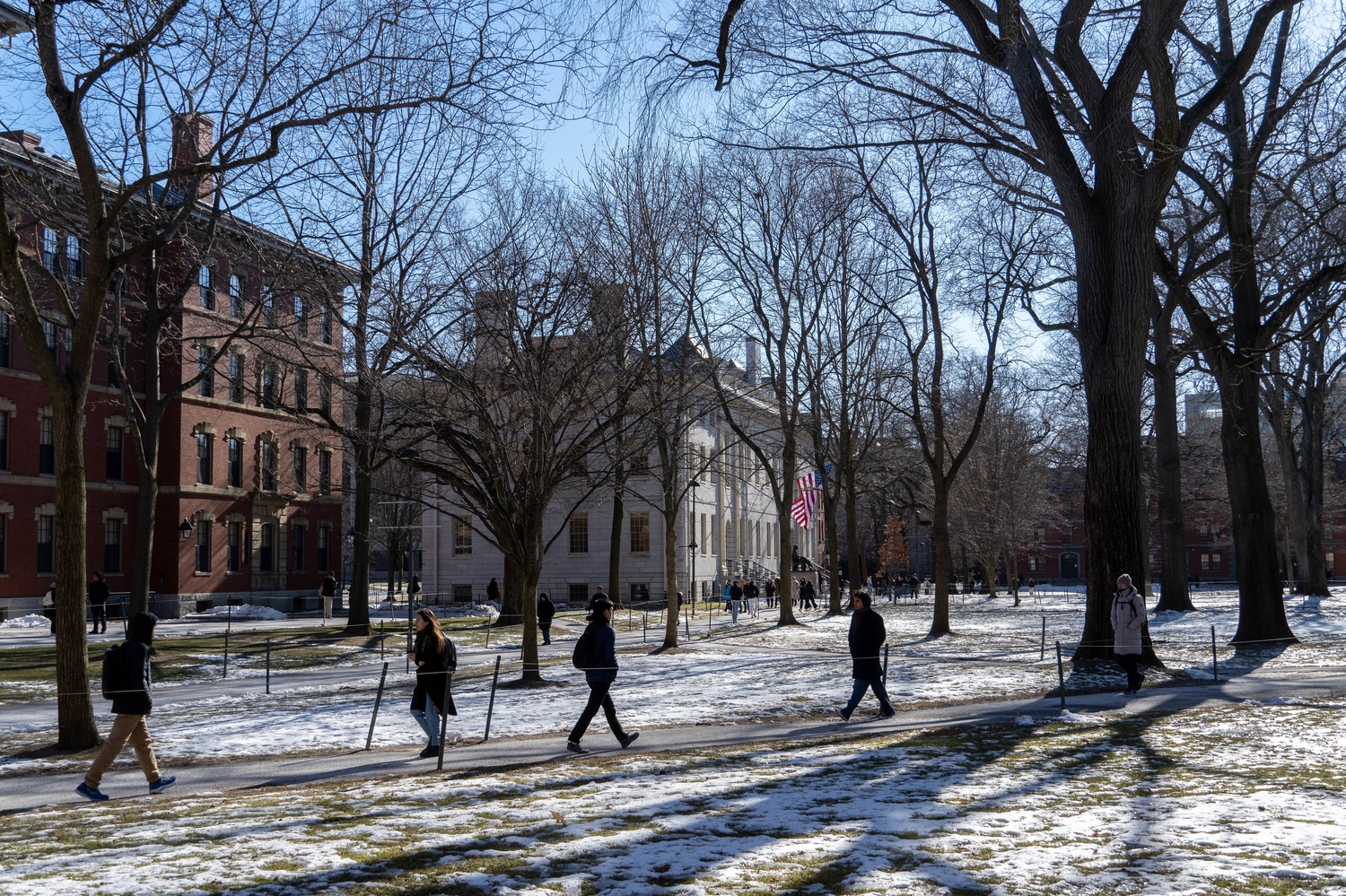
News
When Professors Speak Out, Some Students Stay Quiet. Can Harvard Keep Everyone Talking?

News
Allston Residents, Elected Officials Ask for More Benefits from Harvard’s 10-Year Plan

News
Nobel Laureate Claudia Goldin Warns of Federal Data Misuse at IOP Forum

News
Woman Rescued from Freezing Charles River, Transported to Hospital with Serious Injuries

News
Harvard Researchers Develop New Technology to Map Neural Connections
Most Harvard Students Do Not Feel Comfortable Sharing Controversial Opinions in Class, Survey Finds

Only one-third of Harvard’s last graduating class felt comfortable expressing their opinions about controversial topics during their time at the College, the University’s 2024 senior survey found, reporting a 13 percent decrease from the Class of 2023.
The full survey results are not public, but were partially included in a report issued last week by the Classroom Social Compact Committee, convened by Faculty of Arts and Sciences Dean Hopi E. Hoekstra last spring in response to questions about the state of free speech on campus.
The committee — co-chaired by Economics professor David I. Laibson ’88 and History professor Maya R. Jasanoff ’96 — wrote in their report that despite “near-universal support for the principle of free speech,” there is disagreement about how Harvard “can support open expression in practice.”
“Whatever the causes of explicit and implicit censorship on campus, it is clear that Harvard hasn’t found a way to address them robustly,” they wrote.
Harvard’s internal senior survey is conducted annually by the Office of Institutional Research and Analytics in May. The 2024 survey had a response rate of 89 percent among graduating students, according to the CSCC.
While the data was not widely distributed, Dean of the College Rakesh Khurana expressed dismay over the 2023 results in a January 2024 email to College affiliates.
“In a university, this freedom comes with the responsibility of being open to debating and dialoguing about important topics,” Khurana wrote. “Yet, on this campus, many students and faculty report feeling they cannot express their views.”
“This environment shuts down learning and growth. I know we can do better,” he added.
Later that semester, Khurana launched the College’s Intellectual Vitality Initiative, aimed at fostering the free exchange of ideas on campus. Though not a result of recent campus tensions, the project addresses many of the criticisms Harvard has faced over its handling of campus antisemitism and Islamophobia, anti-Arab, and anti-Palestinian bias following the onset of the Israel-Hamas war.
Since then, according to the 2024 survey results, students have become even less likely to share their opinions openly.
According to the survey, students who reported being somewhat or very reluctant to express their views on controversial topics cited fears of being labeled offensive and criticized by their peers as the primary reasons.
Those fears were also the subject of an October report by the University’s Open Inquiry and Constructive Dialogue working group, which recommended adopting a non-attribution policy in all Harvard schools to encourage participation in discussions on controversial issues.
That report also included similar results from a University-wide classroom climate survey which found that 45 percent of students in all schools are hesitant to share views on controversial issues in class.
The undergraduate senior survey found that a student’s political affiliation influenced how comfortable they felt in expressing opinions.
While 41 percent of liberal students reported feeling comfortable discussing controversial topics, only 25 percent of moderates and 17 percent of conservatives felt similarly.
More than half of the Class of 2024 — 56 percent — identified as liberal or very liberal, while only 9 percent of the class identified as conservative or very conservative.
Slightly more than a quarter of the class of 2024 respondents said they only like to engage socially with people who share their political beliefs. Only 29 percent disagreed or strongly disagreed with that statement.
In the CSCC report, the committee wrote that reluctance to engage across ideological lines was preventing students from “learning and practicing how to speak about topics that are fraught, politically or otherwise.”
They recommended instructors be aware of how their own beliefs affect their teaching and explicitly inform students that holding political views that differ will not result in negative consequences.
“A successful education is only possible when academic leaders, administrators, and other societal decision-makers foster the institutional conditions that enable students and teachers to flourish,” the committee wrote.
“It is therefore incumbent on instructors to explain and abide by the principle that students are free to hold and express political opinions that differ from those of their instructors, without fear of negative consequences,” they added.
—Staff writer Samuel A. Church can be reached at samuel.church@thecrimson.com. Follow him on X @samuelachurch.
—Staff writer Cam N. Srivastava can be reached at cam.srivastava@thecrimson.com. Follow him on X @camsrivastava.
Want to keep up with breaking news? Subscribe to our email newsletter.
